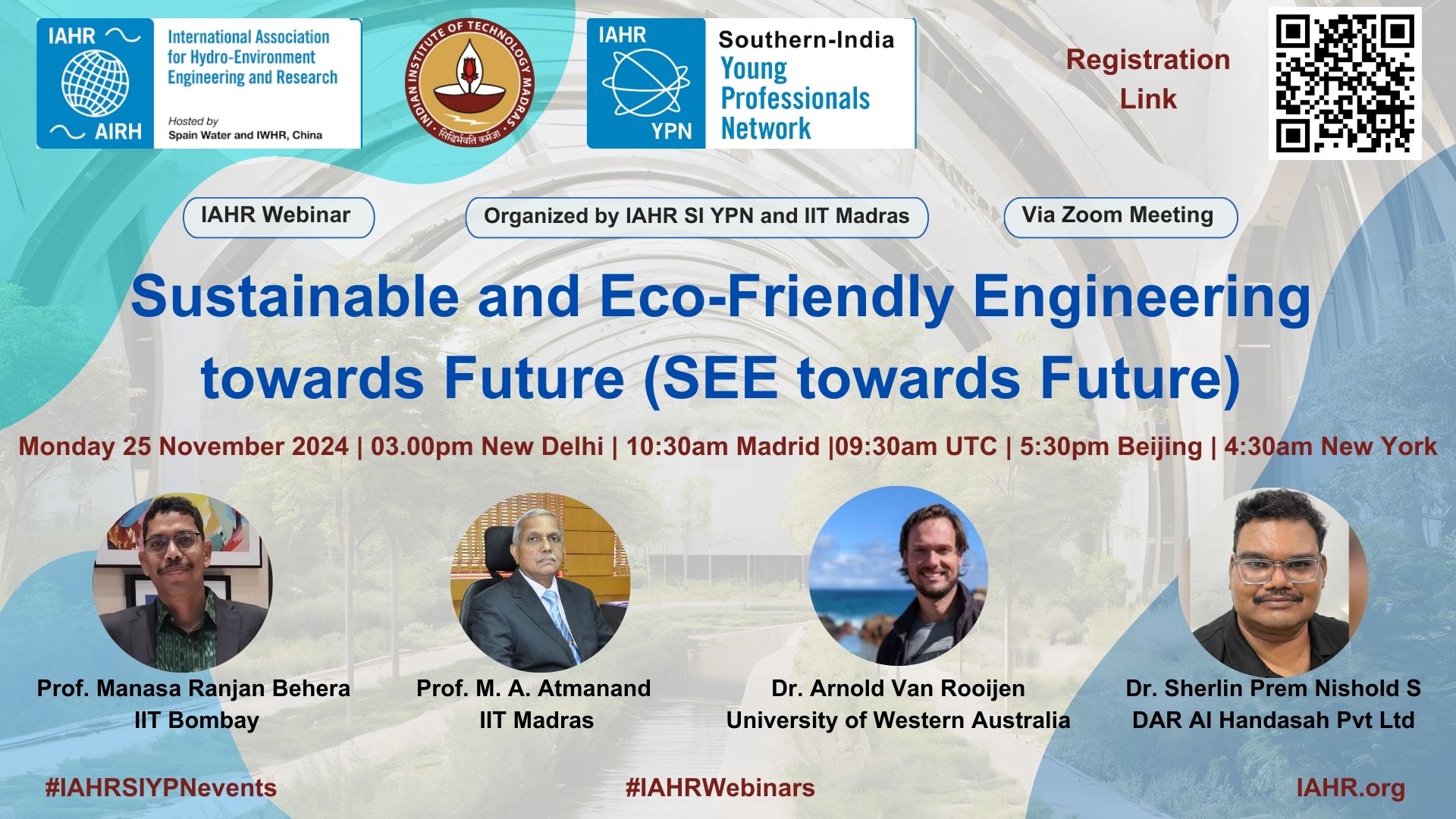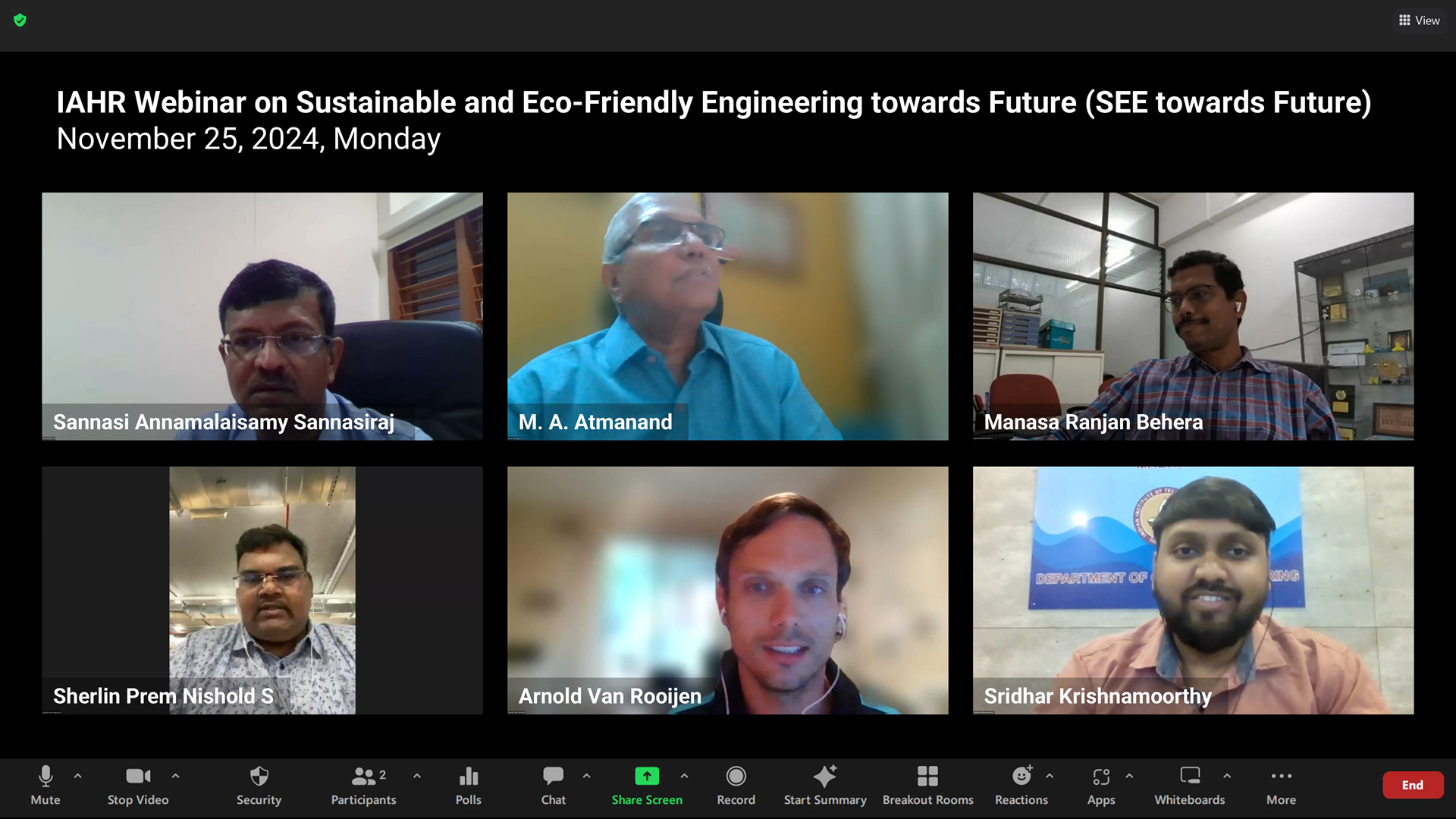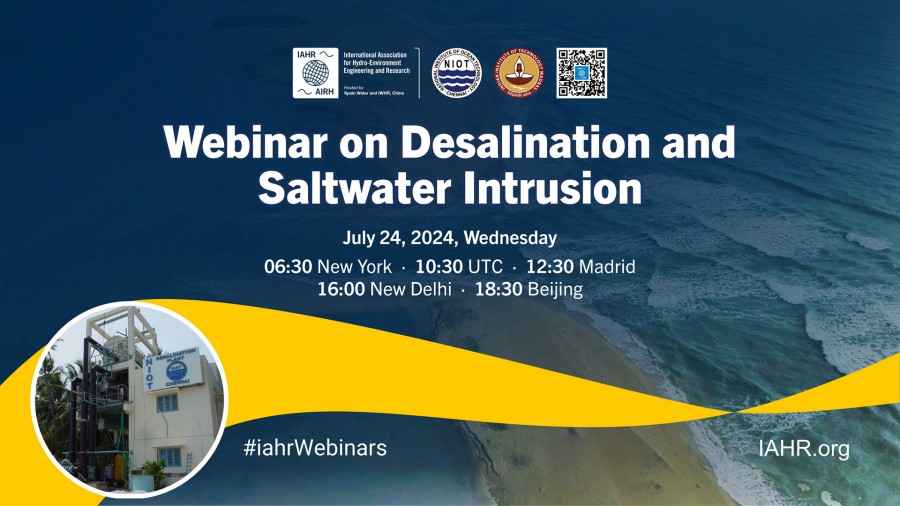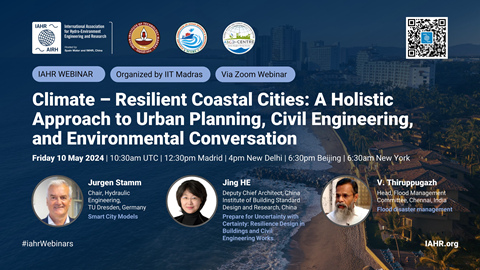Summary of IAHR Webinar on Sustainable and Eco-Friendly Engineering Towards Future (SEE Towards Future)

On November 25, 2024, the IAHR Southern-India Young Professionals Network (IAHR SI YPN), and the Indian Institute of Technology Madras (IITM) co-hosted the Webinar on Sustainable and Eco-Friendly Engineering Towards Future (SEE Towards Future). The event brought together experts in the field of sustainable engineering to discuss eco-friendly solutions and practices. The webinar featured presentations from Prof. M. A. Atmanand, Prof. Manasa Ranjan Behera, Dr. Sherlin Prem Nishold S, and Dr. Arnold Van Rooijen, with Prof. Sannasiraj S A giving the introductory address and Mr. Sridhar Krishnamoorthy serving as moderator. The webinar provided a platform for participants to learn about sustainable technologies and discuss practical challenges and solutions for a more eco-conscious future.
The webinar began with an introductory address by Prof. Sannasiraj. He welcomed the participants to the webinar on Sustainable and Eco-Friendly Engineering Towards Future. He emphasized the transformative role of sustainable engineering in addressing global challenges, particularly in resource management and coastal engineering. The session aimed to highlight innovative technologies and strategies for building a sustainable and resilient future, focusing on the pressures faced by coastal regions due to climate change and urbanization. He introduced the four distinguished speakers who would share their expertise on topics related to designing coastal structures, coastal protection, and solutions for flooding and erosion.
![1732759633141541.jpg 2_Atmanand[00_01_17][20241126-145847-2].jpg](https://iahr.oss-accelerate.aliyuncs.com/upload/image/20241128/1732759633141541.jpg)
Presentation 1. Blue Economy - Indian Perspective
Prof. M. A. Atmanand discussed the concept of ocean wealth, highlighting the ocean’s role in absorbing carbon dioxide and providing oxygen, which cannot be quantified. He mentioned that estimates suggest the ocean’s value is about $24 trillion. Prof. M. A. Atmanand also talked about the Blue Revolution, symbolized by India’s Blue Ashoka Chakra, and discussed the various resources within the Blue Economy, such as minerals, bio-prospecting, tourism, and seawater utilization. He emphasized the importance of sustainable use of ocean resources, particularly renewable energy sources like offshore wind and ocean thermal energy, while acknowledging the challenges of extracting non-renewable resources like hydrocarbons and manganese nodules.
![1732759645796849.jpg 3_Manasa[00_04_16][20241126-145917-3].jpg](https://iahr.oss-accelerate.aliyuncs.com/upload/image/20241128/1732759645796849.jpg)
Presentation 2. Design of Sustainable Coastal Structures in a Changing Climate
Prof. Manasa Ranjan Behera discussed the design of sustainable coastal structures in the context of a changing climate. He focused specifically on coastal deck structures, such as jetties and piled jetties, and the challenges posed by extreme wave conditions. Manasa emphasized that climate change has led to an increase in wave heights and sea level rise, both of which impact the design and longevity of these structures. He explained the need for engineers to consider these factors when designing new structures or retrofitting existing ones. The presentation included details on evaluating wave forces using numerical models, with a focus on extreme waves, non-breaking and breaking waves, and their impact on coastal decks. Behera highlighted the importance of understanding the dynamics of these waves to improve the design of coastal structures and ensure their resilience against climate change.
![1732759658720770.jpg 4_Sherlin[00_02_03][20241126-150009-6].jpg](https://iahr.oss-accelerate.aliyuncs.com/upload/image/20241128/1732759658720770.jpg)
Presentation 3. Utilisation of Copper Slag as Core for Coastal Protection
Dr. Sherlin Prem Nishold S discussed alternative coastal protection methods, specifically focusing on the utilization of copper slag as a core material for coastal defense structures. He highlighted the impact of coastal erosion, driven by wave characteristics, and explained that erosion can be managed through both hard and soft engineering measures. Sherlin emphasized the need for sustainable solutions beyond traditional methods like rubble mound breakwaters. He introduced alternative materials such as geosynthetics and geotubes, which can reduce the environmental footprint while providing effective coastal protection. He also discussed various coastal protection techniques, including sheet pile walls, groins, and using natural elements like deep-rooted trees. In conclusion, Sherlin stressed the importance of site-specific solutions and the need for ongoing innovation in coastal engineering to address erosion sustainably.
![1732759669439721.jpg 5_Arnold[00_02_24][20241126-145937-5].jpg](https://iahr.oss-accelerate.aliyuncs.com/upload/image/20241128/1732759669439721.jpg)
Presentation 4. Natural and Nature-Based Protection against Coastal Flooding and Erosion
Dr. Arnold Van Rooijen discussed coastal management strategies, focusing on the challenges posed by sea-level rise and coastal erosion. He introduced different approaches to coastal protection, including hard engineering solutions like groins and breakwaters, as well as soft methods such as beach nourishment. Arnold also emphasized the growing interest in nature-based solutions, such as using ecosystems (mangroves, seagrasses, and coral reefs) to provide coastal protection. He explained how these natural systems dissipate wave energy and reduce erosion. Additionally, he highlighted hybrid approaches that combine hard structures with nature-based methods, such as artificial reefs, which aim to provide both coastal protection and ecological benefits. Arnold concluded by emphasizing the importance of research, innovation, and a combination of strategies to create sustainable and adaptive solutions for coastal protection.

The Q&A session, moderated by Mr. Sridhar Krishnamoorthy, focused on several key topics related to sustainable coastal protection. Discussions included balancing economic growth with marine ecosystem conservation, the impact of sea-level rise and extreme waves on coastal structures, and the role of geoengineering solutions like geotubes and copper slag in coastal defense. Nature-based solutions, such as mangrove restoration and floating systems, were also explored, with concerns raised about their effectiveness in different regions. Overall, the session highlighted the need for site-specific solutions, further research, and the integration of both traditional and innovative approaches to address coastal erosion and flooding challenges.
The webinar concluded with closing remarks from Mr. Sridhar Krishnamoorthy, who summarized the valuable insights shared by all the speakers. The discussions emphasized the importance of sustainable coastal protection, addressing the challenges of climate change, and the integration of innovative, eco-friendly solutions. The speakers covered a range of topics, from the blue economy and resilient coastal structures to the use of industrial byproducts in coastal defense and the growing interest in nature-based solutions. Mr. Krishnamoorthy expressed his gratitude to the speakers and participants, encouraging continued engagement in future IAHR events focused on collaboration and sustainability.
Other webinars of the series include:
2024-07-24
2024-05-10
» Watch the recording in IAHR Video Library

